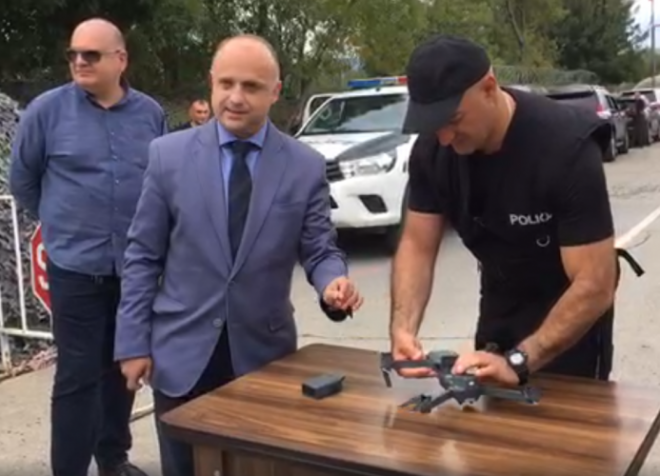

Georgian vigilante group Power in Unity has claimed responsibility for bringing down an unarmed South Ossetian drone. South Ossetian authorities reacted angrily to the downing, accusing the Georgian police of shooting down the drone themselves.
The incident comes as tensions remain high in the region after South Ossetian forces mobilised near the border following the erection of a new Georgian police checkpoint.
Initial reports of the incident came on Sunday when South Ossetia’s State Security Committee (KGB) announced that Georgia had shot down the unmanned aerial vehicle.
The Georgian State Security Service (SSG) claimed the drone was taken down by a drone operated by Georgian activists.
Following the KGB’s announcement on Sunday, Davit Katsarava, the leader of Georgian vigilante group Anti-Occupation Movement — Power in Unity, claimed that they ‘neutralised’ the South Ossetian drone with a drone of their own.
Katsarava also published a video allegedly showing an SSG official retrieving the South Ossetian drone from them.
On Monday, the KGB accused the Georgian authorities of fabricating the circumstances around the downing of the drone.
In their 2 September statement, the KGB insisted that their quadrocopter was shot down by precision fire from Georgian police, citing ‘numerous’ witness accounts from the local population.
They called the footage published by Katsarava ‘staged’, and questioned reports from both him and the SSG that the drone descended near the Georgian Government-controlled village of Abano in Kareli Municipality.
According to the KGB, the incident took place near the South Ossetian-controlled village of Tsnelisi (Uista). Control over the region between Tsnelisi and the Georgian government-controlled village of Chorchana led to rising tensions last week after Georgian police set up a new checkpoint in the forested buffer zone between the two.
[Read on OC Media: South Ossetia orders tit-for-tat checkpoint construction in latest border escalation].
In their 2 September statement, South Ossetia’s KGB said that the ‘best way out’ of the situation would be for the quadrocopter to be handed over to them through the Incident Prevention and Response Mechanism (IPRM), a format of a dialogue between the sides set up after the August 2008 war.
Meetings with South Ossetians are regularly held in the Georgian-controlled village of Ergneti near the South Ossetian capital Tskhinvali (Tskhinval).

The statement from the KGB came before South Ossetian representatives met Georgians for the third time in a week, after walking out of 29 August’s discussion after five hours of talks.
Katsarava’s group, which has organised ‘civil patrols’ through Georgian government-controlled villages adjacent to South Ossetia, have also been active in mobilising activists at the Georgian-Azerbaijani border. A dispute over the Davit Gareja monastery complex, known as Keshikchidagh in Azerbaijan, re-erupted in July.
[Read more on OC Media: Azerbaijan–Georgia row reignites over Davit Gareja monastery complex].
Katsarava and his supporters have claimed that the Georgian government has failed to counter detentions of ethnic Georgians in the conflict zone by South Ossetian authorities as well as ‘borderisation’ — the installation of fencing around South Ossetia.
Does Power in Unity pose a threat?
Following reports on Sunday of the downing of the South Ossetian drone, Katsarava’s group came under fire from some Georgians on Facebook, who argued that their actions could lead to an escalation of the conflict in the region, while others supported the group.
Paata Zakareishvili, who served as Georgia’s State Minister for Reconciliation (previously reintegration) from 2012–2016, said the actions of the Power in Unity group ‘went beyond anything’.
Zakareishvili told OC Media that the group could ‘easily undermine the peace process in the conflict zone’, and questioned why the Georgian government ‘fail to react’ to them.
He said that Katsarava’s group ‘wasn’t a problem as much as the Georgian security system’s approach to them’, including in the latest incident with the drone.
According to Zakareishvili, the SSG should clarify either that operating drones in ‘the riskiest zone on Georgian territory’ is permitted for anyone or that those engaged in such activities cause problems and should at least be questioned.
Tinatin Khidasheli, a former defence minister under Georgian Dream and a frequent government critic also blamed the Georgian government for the incident. Khidasheli told OC Media that the source of the problem was inaction by the state, not the activities of independent groups that stemmed from this.
She said she could not understand why Georgia did not convene the State Security Council after tensions over the new checkpoint first arose.
The recently reformed security council is currently headed by Interior Minister Giorgi Gakharia, who it is widely speculated will be appointed Prime Minister.
[Read more about the controversy surrounding the State Security Council: Interior Minister Gakharia appointed secretary of Georgian Security Council]
‘No group can pose a threat if state institutions have a strategy and follow it strictly. In Georgia, the state security coordination system is out of order, which results in groups self-organising and acting in a way they deem necessary’, Khidasheli said.
Shota Utiashvili, a Senior Fellow at Tbilisi-based think-tank the Rondeli Foundation and a former interior ministry official, told OC Media that Power in Unity did not pose a danger.
‘The activities of groups that remind citizens daily about the problems coming from the [Russian] occupation are important. At the same time, it is important to act carefully when operating near the occupation line’, he said.
Utiashvili added that Power in Unity ‘did not trigger security risks’ as they were a small group of unarmed civilian activists that do not cross into South Ossetia.
For ease of reading, we choose not to use qualifiers such as ‘de facto’, ‘unrecognised’, or ‘partially recognised’ when discussing institutions or political positions within Abkhazia, Nagorno-Karabakh, and South Ossetia. This does not imply a position on their status.





